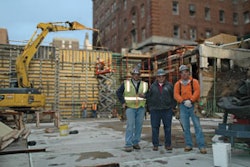By Sid Stansell, Concrete Careers.com
It was 1976. I had just started my small construction company and within about two years it was growing beyond my expectations. Then the economy took on an alien life form! Inflation, shortages, recession, tax hikes, you name it. Those prone to panicking started sitting on their hands. I thought about it and decided it was a great opportunity to improve the quality of my personnel. It was the best business decision I ever made!
I believe we are right there, right now, again. A few months ago at the World of Concrete, which we attend with an exhibitor's booth each year, I sensed a renewed commitment from the participants I spoke with to use this "down time" to sift out some of the non-performing and under-performing employees and replace them with top-shelf team members.
One of my favorite business strategy books is Jim Collins' Good to Great: Why Some Companies Make the Leap ... and Others Don't. I highly recommend this to anyone looking for a pattern of greatness to study. Anyway, in the book he makes a statement that has become a mantra around our office, "The main point is to first get the right people on the bus (and the wrong people off the bus) before you figure out where to drive it." The inherent power of assembling the right team and then formulating a strategy to determine the direction of the company outperforms the comfortable, "I founded this company and I know what is best" mentality.
One of the qualities I appreciate most about our CEO, Gene Vineyard, is his ability to step into the office and ask each associate his take on issues. His intention is to garner the best ideas and as a team to move forward. Many entrepreneurs and corporate executives alike have the "dictator" mentality. A dictatorship does carry with it a certain amount of efficiency in terms of decision making. It does not take much work to just tell people "we are going to do it this way", but what is lost is the incentive for the members of the team to think creatively. I have traveled in third world counties and have observed the otherwise intelligent and industrious become slaves to the mentality of "there is nothing I can do about it." That works in companies as well. If you don't include your team in the process, you only get a fraction of what they have to offer.
That being said (and assuming you agree), read on for some suggestions on how to capitalize during this slowed economy and use the recession to improve your infrastructure. Here is a list to consider:
1. Evaluate each of your employees at every level, and place them in one of three categories based on three characteristics: attitude (the most important), productivity and activity. Category I - the high performers, Category II - underperformers and Category III - non performers. (For larger corporations, evaluate each department head and if they are in Category I, have them perform this evaluation on the employees in their departments.)
2. Eliminate each of the employees in Category 3, the non performers. They have a negative attitude, are not producing what you hired them for and they are not even active. They probably do not even need replacing since they are not contributing.
These decisions should not be taken lightly. It is not a personality thing, it is a wise thing for your company and the employee. They are not adding anything of value and thus are devalued in the assessment of their own worth. They need to go some place where they can be productive and feel good about themselves and the contribution they make.
One of my favorite TV shows was "Seinfeld," and one of the poignant episodes involved Kramer dressing up and going to work at this big company. The boss finally figures out Kramer does not know anything nor does he do anything and he calls him in to fire him. Kramer says, "You can't fire me, I don't even work here." Some employees get a paycheck, but don't even work there. You know what to do.
3. Encourage those in Category II. This is the toughest category, because they may be very strong in some areas and weak in others. A general rule of thumb: they can probably be brought up to Category I if they are strong in two out of three of the characteristics mentioned above. If they have a great attitude and are active, they probably just need a little guidance in how to re-focus the activity to become more productive. Given the expectations and a little time, they should move into Category I. If not, they are a good candidate for replacement.
Next, if you have an under-performing employee that has adequate activity and non-stellar productivity, but an indifferent or even defeatist attitude, they are probably headed for the chopping block. Attitudes can and should be changed, but sometimes there is an unidentified, underlying grievance that cannot be reconciled. If that is the case, they should be replaced.
4. Elevate those in Category I. This is no time to cut back the benefits, perks, salary or freedom of those who are keeping the "ball rolling". At this stage, in this economy, do everything to encourage their continued loyalty and input into the success of the company. And you do that by being loyal to them. If it is fiscally possible, even a raise of some description would speak volumes.
The overwhelming majority of the decision makers we have been in contact with in the recent weeks have this prevailing attitude in common - they do not just want to survive, but they want to thrive. One company president said to us, "I want you to find for me a top, top, 'A' player. I am looking to replace the mediocre with a star." We have seen an unusual influx of candidates in the last few months who would not normally be in the market for a career move. Many of them are "on the street" through no fault of their own, either a casualty of consolidation and buyout, downsizing, or company closings. For whatever reason, the time to pick up some of these all star team members has never been better. The long-term benefit will be a stronger, more competitive industry as a whole, with higher quality companies thriving and growing once again.
Sid Stansell is the managing partner in an industry specific recruiting firm called ConcreteCareers.com. Concrete Careers has been placing middle- and high-level personnel exclusively for the concrete and construction fields since 1976. He has degrees in economics and animal science from the University of Georgia and speaks at leadership seminars and conferences nationwide and internationally.




















